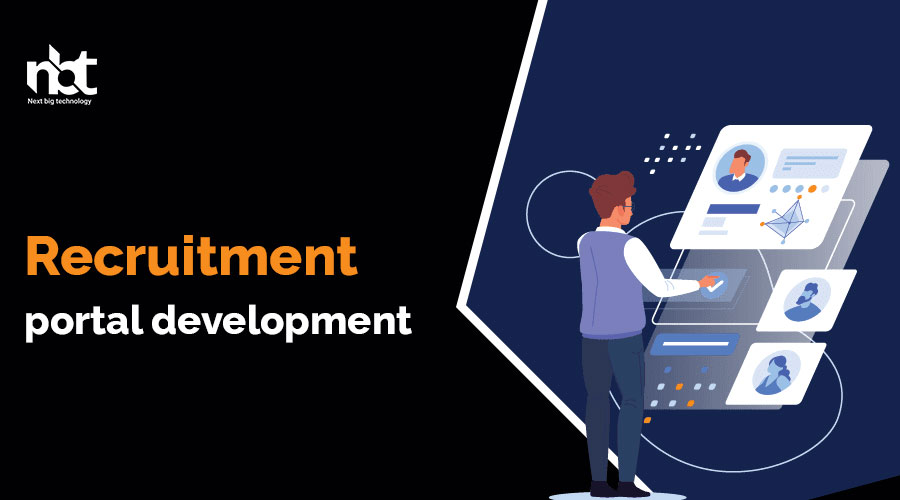Table of Contents
Recruitment portal development Services
In today’s fast-paced digital era, the recruitment landscape has undergone a profound transformation. Traditional methods of hiring have given way to more efficient and streamlined approaches, with recruitment portals emerging as a cornerstone of modern talent acquisition strategies. As businesses strive to attract top talent in competitive markets, the need for bespoke recruitment portal development services has become increasingly paramount.
Recruitment portal development services encompass a range of solutions designed to empower organizations in their quest to find the perfect candidates. These services are tailored to meet the unique requirements of each client, ensuring seamless integration with existing systems and workflows. From conceptualization to implementation and beyond, expert developers work closely with businesses to create user-friendly, feature-rich portals that streamline the entire recruitment process.
One of the primary benefits of recruitment portal development services is the ability to centralize the hiring process. Instead of juggling multiple platforms and tools, recruiters can access all relevant information and tools from a single, intuitive interface. This not only saves time but also reduces the likelihood of errors and oversights, resulting in a more efficient and effective recruitment process.
Furthermore, recruitment portals can be customized to align with the branding and culture of the hiring organization. This helps create a cohesive experience for both recruiters and candidates, reinforcing the employer brand and attracting top talent. By incorporating elements such as custom branding, messaging, and multimedia content, recruitment portals can effectively communicate the unique value proposition of the organization, making it stand out in a crowded job market.
In addition to enhancing the candidate experience, recruitment portal development services also offer powerful analytics and reporting capabilities. By leveraging data-driven insights, recruiters can gain valuable intelligence into their hiring process, identifying areas for improvement and optimization. From tracking key metrics such as time-to-fill and cost-per-hire to analyzing candidate engagement and conversion rates, these analytics empower organizations to make informed decisions and drive continuous improvement.
Security is another critical aspect of recruitment portal development services. With sensitive candidate information and proprietary company data being exchanged, robust security measures are essential to protect against cyber threats and data breaches. Experienced developers implement state-of-the-art encryption protocols, access controls, and monitoring tools to safeguard the integrity and confidentiality of data throughout the recruitment lifecycle.
How to Create a Recruitment portal development solutions
In today’s competitive job market, having a robust recruitment portal can make all the difference for businesses looking to attract top talent efficiently. A well-designed recruitment portal not only streamlines the hiring process but also enhances the overall candidate experience. If you’re considering developing a recruitment portal for your organization, here’s a comprehensive guide to help you navigate through the process effectively.
Understanding the Need: Before delving into the technical aspects of development, it’s crucial to understand the specific needs and requirements of your organization. Conduct a thorough analysis of your current recruitment process, identifying pain points, bottlenecks, and areas for improvement. Additionally, consider the unique culture and values of your company, as these should be reflected in your recruitment portal.
Defining Key Features: Once you have a clear understanding of your organization’s requirements, it’s time to define the key features of your recruitment portal. Some essential features to consider include:
- User-Friendly Interface: A clean and intuitive interface that makes it easy for both recruiters and candidates to navigate the portal.
- Job Posting and Management: An efficient system for posting job vacancies, managing job listings, and tracking the status of each position.
- Candidate Management: Tools for managing candidate applications, including resume parsing, candidate filtering, and communication features.
- Search and Filter Options: Advanced search and filter options to help recruiters quickly find the most suitable candidates for each position.
- Integration with HR Systems: Seamless integration with existing HR systems for efficient data management and workflow automation.
- Analytics and Reporting: Insights into recruitment metrics and performance indicators to track the effectiveness of your hiring process.
Choosing the Right Technology: Selecting the right technology stack is crucial for the success of your recruitment portal. Consider factors such as scalability, security, and ease of integration when choosing your development tools and platforms. Popular choices for recruitment portal development include:
- Frontend Frameworks: Angular, React, or Vue.js for building responsive and interactive user interfaces.
- Backend Technologies: Node.js, Python (Django or Flask), or Ruby on Rails for robust backend development.
- Database Management: MySQL, PostgreSQL, or MongoDB for efficient data storage and retrieval.
- Cloud Services: Leveraging cloud services such as AWS, Azure, or Google Cloud for scalability and reliability.
Development and Testing: Once you have finalized the technical specifications and chosen your technology stack, it’s time to begin the development process. Work closely with your development team to ensure that the recruitment portal is developed according to your requirements and specifications. Conduct thorough testing at each stage of development to identify and address any bugs or issues promptly.
Deployment and Maintenance: After development and testing are complete, it’s time to deploy your recruitment portal to production. Work with your IT team to ensure a smooth deployment process, and monitor the portal closely to address any performance issues or downtime. Additionally, establish a maintenance schedule to ensure that your recruitment portal remains up-to-date and secure.
Why Should You Go for Recruitment portal development solutions
In today’s dynamic business landscape, finding and retaining top talent is crucial for the success of any organization. With the ever-increasing demand for skilled professionals, companies are constantly seeking innovative solutions to streamline their recruitment processes. One such solution gaining momentum is recruitment portal development.
Recruitment portal development solutions offer a plethora of benefits that can revolutionize the way companies attract, evaluate, and hire candidates. Let’s delve into the compelling reasons why businesses should consider investing in these solutions.
- Enhanced Efficiency: Recruitment portal development streamlines the entire hiring process, from job posting to candidate selection. By automating repetitive tasks such as resume screening and scheduling interviews, it significantly reduces the time and effort required to fill vacant positions. This efficiency not only saves resources but also enables HR professionals to focus on more strategic activities, ultimately boosting productivity.
- Wider Reach: Unlike traditional recruitment methods, which are often limited by geographical boundaries, recruitment portals have a global reach. These platforms allow companies to connect with potential candidates from diverse backgrounds and locations, ensuring access to a broader talent pool. With features like targeted job advertisements and social media integration, recruitment portals amplify visibility, attracting candidates with the right skills and experience.
- Improved Candidate Experience: In today’s competitive job market, providing a positive candidate experience is paramount. Recruitment portal development solutions offer user-friendly interfaces that make the application process seamless and intuitive. Features such as personalized dashboards, status updates, and communication tools keep candidates informed and engaged throughout the recruitment journey. A positive candidate experience not only enhances employer branding but also increases the likelihood of attracting top-tier talent.
- Data-Driven Decision Making: Recruitment portals generate valuable insights through data analytics, enabling data-driven decision-making. By tracking key metrics such as applicant demographics, sourcing channels, and time-to-hire, companies gain a deeper understanding of their recruitment performance. These insights empower HR professionals to identify bottlenecks, optimize processes, and make informed decisions to improve overall efficiency and effectiveness.
- Cost Savings: Traditional recruitment methods often incur significant costs, from advertising expenses to agency fees. Recruitment portal development solutions offer a cost-effective alternative by centralizing all recruitment activities onto a single platform. With features like applicant tracking systems and automated workflows, companies can reduce reliance on external resources, thereby minimizing recruitment costs while maximizing ROI.
Market Prospects of Custom Recruitment portal development solutions
In today’s dynamic business landscape, the demand for top talent continues to soar, propelling the need for efficient recruitment processes. With technology evolving rapidly, custom recruitment portal development solutions have emerged as a game-changer for businesses seeking to streamline their hiring processes. This article delves into the market prospects of these solutions and how they are reshaping the recruitment industry.
Introduction to Custom Recruitment Portal Development Solutions
Custom recruitment portal development solutions are tailor-made platforms designed to meet the unique hiring needs of organizations. These portals offer a wide array of features, including job posting, applicant tracking, candidate management, and analytics, all integrated into a single, user-friendly interface. By leveraging advanced technologies such as AI, machine learning, and data analytics, these solutions enhance efficiency, reduce time-to-hire, and improve overall recruitment outcomes.
Growing Demand for Streamlined Recruitment Processes
In today’s competitive job market, organizations are under pressure to attract top talent swiftly and effectively. Traditional recruitment methods often prove time-consuming, resource-intensive, and prone to biases. Custom recruitment portals address these challenges by automating repetitive tasks, enabling seamless communication between recruiters and candidates, and providing data-driven insights for informed decision-making.
Market Trends and Opportunities
The market for custom recruitment portal development solutions is witnessing significant growth, driven by several key trends and opportunities:
- Remote Work: The rise of remote work has expanded the talent pool globally, prompting organizations to invest in recruitment solutions capable of sourcing and assessing candidates from diverse geographical locations.
- Candidate Experience: As candidate experience becomes a critical differentiator for employers, there is a growing emphasis on recruitment portals that offer intuitive interfaces, mobile compatibility, and personalized communication to engage and retain top talent.
- AI-Powered Solutions: The integration of artificial intelligence and machine learning algorithms enables predictive analytics, resume parsing, and candidate matching, empowering recruiters to identify the best-fit candidates more efficiently.
- Diversity and Inclusion: Companies are increasingly prioritizing diversity and inclusion in their hiring practices. Custom recruitment portals equipped with bias detection algorithms help mitigate unconscious biases and promote fairer hiring decisions.
- Integration with HR Systems: Seamless integration with existing HR systems such as applicant tracking systems (ATS), human resource information systems (HRIS), and payroll software enhances workflow efficiency and data accuracy across the recruitment lifecycle.
Challenges and Considerations
While the market prospects for custom recruitment portal development solutions are promising, several challenges and considerations must be addressed:
- Security and Data Privacy: With sensitive candidate information stored on these platforms, ensuring robust security measures and compliance with data protection regulations such as GDPR is imperative.
- Customization and Scalability: Organizations have unique hiring processes and requirements. Custom recruitment portals should offer flexibility and scalability to accommodate evolving business needs.
- User Adoption: Successful implementation relies on widespread adoption by recruiters and hiring managers. User-friendly interfaces, comprehensive training programs, and ongoing support are essential for maximizing the ROI of these solutions.
- Cost vs. Value: While custom recruitment portals require initial investment, the long-term benefits in terms of time savings, improved quality of hires, and enhanced employer branding justify the costs incurred.
Essential Features of a Recruitment portal development solutions
In today’s fast-paced digital era, recruitment has undergone a significant transformation. Traditional methods of hiring are being replaced by sophisticated online platforms known as recruitment portals. These portals streamline the hiring process, making it more efficient and effective for both employers and job seekers. However, not all recruitment portal development solutions are created equal. To ensure success, it’s crucial to understand the essential features that make up a top-notch recruitment portal. Let’s delve into these key components:
- User-Friendly Interface: A recruitment portal should have an intuitive and user-friendly interface that is easy to navigate. Job seekers and employers alike should be able to access the platform effortlessly, browse through listings, and perform necessary actions without encountering any complications.
- Advanced Search and Filtering Options: An effective recruitment portal should offer advanced search and filtering options to help users refine their job searches or candidate selections. This includes filters based on location, job title, salary range, experience level, and more. The ability to customize searches ensures that users can find the most relevant opportunities or candidates quickly.
- Mobile Compatibility: With the increasing use of mobile devices, it’s essential for a recruitment portal to be fully optimized for mobile compatibility. This allows users to access the platform conveniently from their smartphones or tablets, enabling them to stay connected and engaged on the go.
- Applicant Tracking System (ATS): A robust ATS is a must-have feature for any recruitment portal. This system enables employers to manage job applications efficiently, track candidate progress throughout the hiring process, and collaborate with team members seamlessly. An ATS streamlines recruitment workflows, saving time and reducing administrative burdens.
- Resume Parsing and Candidate Matching: Advanced recruitment portals utilize resume parsing technology to extract relevant information from candidate resumes automatically. This information is then used to match candidates with suitable job opportunities based on their skills, experience, and qualifications. This feature simplifies the screening process for employers and improves the overall quality of matches.
- Communication Tools: Effective communication is key to successful recruitment. A recruitment portal should provide built-in communication tools such as messaging systems, chatbots, or email integration to facilitate seamless interactions between employers and candidates. Clear and timely communication enhances the candidate experience and fosters positive relationships.
- Analytics and Reporting: To measure the effectiveness of recruitment efforts, it’s essential to have access to comprehensive analytics and reporting features. Recruitment portals should offer insights into key metrics such as application rates, candidate engagement, time-to-hire, and source of hire. These analytics empower employers to make data-driven decisions and optimize their recruitment strategies.
- Integration Capabilities: Integration with other systems and platforms, such as HR management software or job boards, enhances the functionality and utility of a recruitment portal. Seamless integration allows for the exchange of data and automation of processes, ensuring a smooth and cohesive recruitment experience.
Advanced Features of a Recruitment portal development solutions
In today’s competitive job market, recruitment portals have become indispensable tools for both employers and job seekers. These platforms not only streamline the hiring process but also offer advanced features to ensure efficiency and effectiveness. Let’s delve into some of the advanced features that modern recruitment portal development solutions bring to the table.
- AI-Powered Candidate Matching: One of the most groundbreaking advancements in recruitment portals is the integration of artificial intelligence (AI) algorithms for candidate matching. These algorithms analyze resumes, job descriptions, and candidate profiles to identify the best fit for a particular role. By leveraging machine learning, these systems continuously improve their matching accuracy over time, saving recruiters valuable time and effort.
- Video Interviewing and Assessment: Traditional recruitment processes often involve multiple rounds of in-person interviews, which can be time-consuming and costly. With video interviewing and assessment capabilities, recruitment portals allow employers to conduct initial screenings remotely. This feature not only saves time but also enables recruiters to reach a broader pool of candidates, regardless of geographical constraints.
- Automated Scheduling and Communication: Keeping track of interview schedules and communicating with candidates can be a logistical nightmare for recruiters. Advanced recruitment portals offer automated scheduling tools that sync with recruiters’ calendars and allow candidates to select interview slots based on availability. Moreover, automated communication features send reminders and updates to candidates, ensuring a smooth and transparent hiring process.
- Data Analytics and Reporting: Data-driven decision-making is crucial in recruitment, and modern portals provide comprehensive analytics and reporting tools. Recruiters can track key metrics such as time-to-fill, source of hire, and candidate engagement rates. These insights enable recruiters to optimize their strategies, identify areas for improvement, and make informed hiring decisions.
- Mobile Optimization and Accessibility: With the increasing reliance on mobile devices, recruitment portals must be optimized for seamless mobile experiences. Advanced solutions offer mobile-responsive designs and dedicated mobile apps, allowing recruiters and candidates to access the platform anytime, anywhere. Mobile optimization enhances accessibility and improves user engagement, catering to the needs of today’s on-the-go workforce.
- Integration with Third-Party Tools and APIs: To further enhance functionality, recruitment portals often integrate with third-party tools and application programming interfaces (APIs). This integration allows recruiters to seamlessly connect with other HR systems, job boards, background screening services, and assessment platforms. By leveraging the capabilities of these external tools, recruitment portals offer a more comprehensive solution for talent acquisition.
- Personalized User Experience: Tailoring the user experience to the unique needs of recruiters and candidates is essential for the success of a recruitment portal. Advanced solutions employ personalization techniques based on user preferences, behavior, and past interactions. From customized dashboards and job recommendations to targeted messaging and content, these portals deliver a personalized experience that enhances user satisfaction and engagement.
Recruitment portal development solutions Timelines
In today’s fast-paced world, businesses are continually seeking ways to enhance their recruitment processes, and the development of recruitment portals has emerged as a game-changer. These portals offer a centralized platform where companies can manage job postings, applicant profiles, and the entire hiring workflow efficiently. However, understanding the timelines involved in developing such solutions is crucial for effective planning and execution.
Understanding Recruitment Portal Development Solutions
Before diving into the timelines, let’s explore the key components of recruitment portal development solutions:
- Requirement Analysis: This initial phase involves understanding the specific needs of the organization, including functionalities required, user roles, and integration with existing systems.
- Design and Prototyping: Once the requirements are clear, the design phase begins, where user interfaces (UI) and user experience (UX) are crafted. Prototyping allows stakeholders to visualize the portal’s look and feel before actual development.
- Development: This is the phase where the actual coding and development of the recruitment portal take place. It involves frontend development (client-side) for the user interface and backend development (server-side) for database management, application logic, and integration with third-party services if needed.
- Testing and Quality Assurance (QA): Thorough testing is essential to ensure the portal functions smoothly and meets all requirements. QA engineers conduct various tests, including functional testing, performance testing, security testing, and usability testing.
- Deployment and Launch: Once testing is complete and any issues addressed, the portal is deployed to the production environment and made accessible to users. Launching the portal involves communicating with stakeholders and providing necessary training to users.
Timelines for Recruitment Portal Development
The timelines for developing a recruitment portal can vary depending on various factors, including the complexity of requirements, team expertise, and project scope. Here’s a general overview:
- Requirement Analysis (1-2 weeks): This phase involves gathering requirements from stakeholders, understanding business objectives, and defining the scope of the project.
- Design and Prototyping (2-3 weeks): Designing the UI/UX and creating prototypes typically takes a couple of weeks. Feedback from stakeholders may lead to iterations before finalizing the design.
- Development (6-10 weeks): The development phase is the most time-consuming, involving frontend and backend development, database design, and integration tasks. Agile methodologies may be employed for faster development cycles.
- Testing and QA (2-4 weeks): Testing is crucial to ensure the portal meets quality standards. Both automated and manual testing procedures are conducted to identify and fix any bugs or issues.
- Deployment and Launch (1-2 weeks): Deploying the portal to the production environment requires careful planning to minimize downtime. Training sessions may be conducted for users to familiarize them with the new system.
How Much Does It Cost to Build a Recruitment portal development solutions?
In today’s fast-paced digital age, businesses are constantly seeking innovative solutions to streamline their recruitment processes. One such solution gaining traction is the development of recruitment portals. These portals offer a centralized platform for employers to manage job postings, applicant tracking, and candidate evaluations efficiently. However, one common question that arises is: How much does it cost to build a recruitment portal development solution?
Understanding the Factors Influencing Cost:
The cost of developing a recruitment portal can vary significantly based on several factors:
- Functionality Requirements: The complexity of features desired in the portal heavily influences the overall cost. Basic functionalities such as job posting, resume parsing, and candidate management will be less expensive compared to advanced features like AI-driven candidate matching or video interviewing capabilities.
- User Interface (UI) and User Experience (UX) Design: A well-designed and intuitive UI/UX is crucial for user engagement. Investing in high-quality design will enhance the user experience but can also increase development costs.
- Integration with Third-Party Tools: If you require integration with external tools such as background checking services, HR management software, or social media platforms, it can add to the development costs.
- Scalability and Customization: Building a scalable solution that can accommodate future growth and customization requirements will impact the initial development investment.
- Security Measures: Data security is paramount, especially when handling sensitive candidate information. Implementing robust security measures will incur additional costs but is essential for protecting user data.
- Development Team Location and Expertise: The hourly rates of development teams vary based on their location and level of expertise. Offshore development teams may offer lower rates but could compromise on quality.
- Maintenance and Support: Post-launch, ongoing maintenance and support are necessary to ensure the portal functions smoothly. Factoring in these costs from the outset is essential.
Estimating Cost Ranges:
While providing an exact figure for the cost of building a recruitment portal is challenging due to the variables involved, we can offer some ballpark estimates:
- Basic Portal: A simple recruitment portal with essential features may cost anywhere from $10,000 to $30,000. This would include functionalities like job posting, resume parsing, and basic candidate management.
- Mid-Range Portal: A more advanced portal with additional features such as AI-driven candidate matching, custom reporting, and integration with third-party tools could range from $30,000 to $100,000.
- Enterprise-Level Portal: For large-scale enterprises requiring highly customized solutions with advanced security features, scalability, and comprehensive support, the cost can exceed $100,000 and go into the six-figure range.
It’s important to note that these figures are estimates, and the actual cost may vary based on individual project requirements and development approaches.
How to Create a Recruitment portal development solutions – Team and Tech Stack
In the dynamic landscape of human resources, where talent acquisition plays a pivotal role in organizational success, having a robust recruitment portal is indispensable. Such a portal streamlines the hiring process, enhances candidate experience, and empowers recruiters with efficient tools. However, creating an effective recruitment portal requires more than just coding skills; it demands a strategic approach, a talented team, and a carefully selected tech stack.
Understanding the Objective
Before diving into development, it’s crucial to understand the objectives and requirements of the recruitment portal. This involves thorough research and collaboration with stakeholders to identify key features, target audience, scalability needs, and integration capabilities.
Building the Right Team
- Project Manager: A seasoned project manager will oversee the development process, ensuring timely delivery, resource allocation, and adherence to quality standards.
- UI/UX Designers: User experience is paramount in a recruitment portal. UI/UX designers will craft intuitive interfaces, smooth navigation, and visually appealing designs to enhance user engagement.
- Developers: Backend developers will handle server-side logic, database management, and API integrations, while frontend developers will bring designs to life, ensuring responsiveness across devices.
- Quality Assurance (QA) Engineers: QA engineers will conduct rigorous testing to identify and rectify bugs, ensuring the portal functions seamlessly.
- Security Experts: Given the sensitive nature of data handled in recruitment portals, security experts will implement robust measures to safeguard against cyber threats and ensure compliance with data protection regulations.
- Data Analysts: Data analysts will leverage analytics tools to gather insights, track user behavior, and optimize the portal for better performance and user experience.
Selecting the Right Tech Stack
- Frontend Technologies: Popular frontend frameworks like React.js or Angular provide scalability, flexibility, and a rich ecosystem of libraries for building interactive user interfaces.
- Backend Technologies: For backend development, technologies like Node.js, Python (with Django or Flask), or Ruby on Rails offer speed, scalability, and ease of integration with databases and third-party APIs.
- Database: Choose a database system that aligns with the scalability and performance requirements of the portal. Options include relational databases like MySQL or PostgreSQL, or NoSQL databases like MongoDB for flexibility with unstructured data.
- Cloud Services: Leveraging cloud platforms such as AWS, Azure, or Google Cloud offers scalability, reliability, and cost-effectiveness in managing server infrastructure and data storage.
- Security Measures: Implementing SSL encryption, secure authentication mechanisms, and regular security audits are essential to protect sensitive data and maintain trust with users.
Iterative Development and Continuous Improvement
Building a recruitment portal is not a one-time endeavor; it’s an ongoing process of iteration and improvement. Adopt agile methodologies to deliver features incrementally, gather feedback from users, and make data-driven decisions for enhancements.
Recruitment portal development solutions Process
In today’s fast-paced business landscape, the competition for top talent is fiercer than ever. As organizations strive to attract and retain the best candidates, the efficiency and effectiveness of their recruitment processes play a crucial role. With the advent of technology, recruitment portal development solutions have emerged as a game-changer, offering a streamlined approach to hiring top talent.
Recruitment portal development solutions encompass a range of customizable tools and features designed to simplify and optimize the recruitment process. From applicant tracking systems (ATS) to candidate assessment tools and interview scheduling capabilities, these solutions offer a comprehensive platform to manage every aspect of the hiring process efficiently.
One of the primary benefits of recruitment portal development solutions is their ability to centralize the entire recruitment process. By consolidating all recruitment-related activities onto a single platform, organizations can eliminate the need for manual paperwork, spreadsheets, and email communications, thereby reducing administrative burden and minimizing the risk of errors.
Moreover, recruitment portals offer advanced filtering and search functionalities, allowing recruiters to quickly sift through large volumes of resumes and identify candidates that best match the job requirements. With features such as keyword-based search, resume parsing, and customizable filters, recruiters can easily narrow down their candidate pool and focus their efforts on the most qualified individuals.
Another key advantage of recruitment portal development solutions is their scalability and flexibility. Whether an organization is a small startup or a multinational corporation, these solutions can be tailored to meet specific needs and requirements. From customizing workflows and branding to integrating with existing HR systems and third-party applications, the flexibility of recruitment portals ensures a seamless integration into any organization’s infrastructure.
Furthermore, recruitment portals empower recruiters with valuable insights and analytics to make informed hiring decisions. By tracking key metrics such as time-to-fill, source of hire, and candidate quality, recruiters can identify bottlenecks in the recruitment process, optimize their sourcing strategies, and improve overall efficiency.
From the candidate’s perspective, recruitment portals offer a user-friendly and engaging experience, enhancing their interaction with the organization’s brand. With features such as mobile optimization, personalized communication, and self-service portals, candidates can easily search and apply for jobs, track their application status, and communicate with recruiters throughout the hiring process.
Next Big Technology – Your Trusted Recruitment portal development solutions Partner
In today’s fast-paced digital era, staying ahead in the recruitment game demands innovative solutions that seamlessly integrate cutting-edge technology. As businesses strive to attract top talent, the role of recruitment portals has evolved from simple job boards to comprehensive platforms offering advanced features and functionalities. In this landscape, partnering with the right development solutions provider becomes crucial for organizations aiming to remain competitive. Enter the next big technology in recruitment: your trusted recruitment portal development solutions partner.
Gone are the days of traditional hiring methods, where paper resumes and physical job postings were the norm. The advent of recruitment portals revolutionized the hiring process, streamlining everything from job posting and candidate screening to interview scheduling and onboarding. However, as technology continues to advance, the demand for more sophisticated and tailored solutions is on the rise.
This is where your trusted recruitment portal development solutions partner comes into play. With a deep understanding of the recruitment industry coupled with expertise in cutting-edge technologies, they offer tailor-made solutions that cater to the specific needs and challenges of modern businesses. Whether you’re a small startup looking to build your first recruitment portal or a large enterprise seeking to revamp your existing platform, partnering with the right development solutions provider can make all the difference.
So, what sets apart a trusted recruitment portal development solutions partner? Firstly, it’s their commitment to staying ahead of the curve when it comes to technology trends. From artificial intelligence and machine learning algorithms for candidate matching to chatbots for seamless communication, they leverage the latest advancements to create intuitive and efficient portals.
Moreover, a trusted partner understands that one size does not fit all when it comes to recruitment solutions. They take the time to understand your unique requirements, challenges, and objectives before crafting a bespoke portal tailored to your needs. Whether you’re focused on niche hiring, volume recruitment, or specialized industries, they have the expertise to deliver a solution that meets your specific goals.
Security is another critical aspect that your trusted partner prioritizes. With the increasing threat of data breaches and cyber attacks, ensuring the security of sensitive candidate and company information is non-negotiable. They implement robust security measures and compliance protocols to safeguard data integrity and confidentiality, giving you peace of mind knowing that your recruitment portal is secure.
Furthermore, your trusted partner doesn’t just deliver a solution and disappear. They provide ongoing support and maintenance to ensure that your portal operates smoothly and efficiently at all times. Whether it’s troubleshooting technical issues, implementing updates, or scaling your portal as your business grows, they’re there every step of the way to provide assistance and guidance.
Enterprise Recruitment portal development solutions
In today’s dynamic business landscape, acquiring the right talent is paramount for the success of any enterprise. With the rapid evolution of technology, traditional recruitment methods have undergone a significant transformation, paving the way for the emergence of enterprise recruitment portal development solutions. These sophisticated platforms are designed to streamline the hiring process, enhance candidate engagement, and ultimately, empower organizations to build high-performing teams efficiently.
The Need for Enterprise Recruitment Portals
Gone are the days when job postings were confined to bulletin boards and newspaper classifieds. In the digital age, job seekers and employers alike demand more sophisticated and efficient recruitment solutions. Enterprise recruitment portals address this need by providing a centralized platform where companies can manage the entire recruitment lifecycle seamlessly.
Key Features and Functionality
- Customizable Job Listings: Enterprise recruitment portals offer customizable templates for job postings, allowing organizations to showcase their employer brand and attract top talent.
- Advanced Candidate Screening: These platforms leverage AI and machine learning algorithms to analyze resumes, assess candidate qualifications, and match them with suitable job opportunities.
- Collaborative Hiring Tools: With features such as interview scheduling, feedback collection, and applicant tracking, enterprise recruitment portals facilitate seamless collaboration among hiring teams.
- Candidate Experience Enhancement: User-friendly interfaces, mobile optimization, and personalized communication channels ensure a positive experience for job seekers throughout the application process.
- Data Analytics and Reporting: By providing insights into recruitment metrics such as time-to-hire, cost-per-hire, and applicant demographics, these portals enable data-driven decision-making and continuous improvement.
Benefits for Enterprises
- Efficiency and Cost Savings: By automating repetitive tasks and streamlining workflows, enterprise recruitment portals reduce the time and resources required to fill vacant positions.
- Access to a Diverse Talent Pool: Online job portals attract candidates from diverse geographical locations and backgrounds, enabling organizations to build inclusive and multicultural teams.
- Enhanced Employer Branding: A well-designed recruitment portal reflects positively on the employer brand, positioning the organization as an attractive destination for top talent.
- Scalability and Flexibility: Whether an enterprise is hiring for a single role or managing a large-scale recruitment drive, these portals offer scalability and flexibility to meet evolving needs.
- Compliance and Security: Enterprise recruitment portals adhere to industry regulations and data protection standards, ensuring compliance with legal requirements and safeguarding sensitive candidate information.
Future Outlook
As technology continues to advance, the role of enterprise recruitment portals in talent acquisition will only become more pronounced. With features such as predictive analytics, virtual hiring events, and enhanced candidate engagement tools on the horizon, these platforms are poised to revolutionize the way organizations attract, assess, and onboard talent.
Top Recruitment portal development solutions Companies
In the fast-paced world of recruitment, where talent acquisition is paramount, having a robust recruitment portal is indispensable for businesses striving for excellence. These portals serve as the bridge connecting employers with potential candidates, streamlining the hiring process, and enhancing overall efficiency. As the demand for such solutions continues to surge, discerning companies are turning to top-notch recruitment portal development solution providers to stay ahead in the game.
Here, we delve into the realm of recruitment technology to unveil the top companies that are revolutionizing the landscape with their innovative solutions:
-
-
Next Big Technology:
Next Big Technology is one of the top development companies for the high-quality development of mobile apps and web development services. They have having experienced in-house team of developers who provide top-notch development services according to the business requirements. NBT provides highly business-oriented services and implements all the latest and trending tools and technologies. They always work hard to deliver a top-notch solution at an affordable cost. They are having experience of more than 13 years and delivered lots of projects around the globe to businesses and clients.
NBT is highly focused on providing top-notch development solutions at a very affordable cost. By using their market experience and development experience, they are delivering proper solutions to clients and various industries for their custom requirements.
Location: India, USA, UK, Australia
Hourly Rate :< $25 per Hour
Employees: 50 – 249
Focus Area
- Mobile App Development
- App Designing (UI/UX)
- Software Development
- Web Development
- AR & VR Development
- Big Data & BI
- Cloud Computing Services
- DevOps
- E-commerce Development
Industries Focus
- Art, Entertainment & Music
- Business Services
- Consumer Products
- Designing
- Education
- Financial & Payments
- Gaming
- Government
- Healthcare & Medical
- Hospitality
- Information Technology
- Legal & Compliance
- Manufacturing
- Media
-
- TalentHub: Renowned for its intuitive interface and advanced features, TalentHub offers end-to-end recruitment portal solutions designed to simplify the hiring process. From applicant tracking to talent analytics, their comprehensive suite of tools caters to the diverse needs of modern businesses.
- Jobvite: As a pioneer in recruitment technology, Jobvite combines innovation with expertise to deliver unmatched results. Their recruitment portal solutions are known for their scalability, integration capabilities, and predictive analytics, enabling organizations to attract, engage, and retain top talent effortlessly.
- Greenhouse: Focused on fostering meaningful connections between employers and candidates, Greenhouse offers a range of recruitment portal solutions geared towards driving recruitment success. From intuitive workflows to personalized candidate experiences, their platforms are engineered to optimize every stage of the hiring process.
- iCIMS: With a commitment to empowering businesses with transformative technology, iCIMS is a trusted partner for recruitment portal development solutions. Their scalable and configurable platforms enable organizations to adapt to evolving hiring needs while delivering unparalleled candidate experiences.
- Breezy HR: Recognized for its simplicity and versatility, Breezy HR offers intuitive recruitment portal solutions that cater to businesses of all sizes. From collaborative hiring tools to customizable pipelines, their platforms are designed to streamline recruitment workflows and maximize productivity.
- SmartRecruiters: Leveraging the power of artificial intelligence and automation, SmartRecruiters provides innovative recruitment portal solutions that redefine the hiring experience. Their intelligent sourcing tools, coupled with robust analytics, empower organizations to make smarter hiring decisions faster.
FAQs on Recruitment portal development solutions
Are you considering building a recruitment portal for your organization but find yourself swamped with questions? Delving into the realm of recruitment portal development can be both exciting and overwhelming, especially if you’re navigating through uncharted waters. To help ease your journey, let’s address some common FAQs surrounding recruitment portal development solutions.
- What is a Recruitment Portal? A recruitment portal is an online platform designed to streamline the hiring process for organizations. It serves as a centralized hub where recruiters can post job openings, manage applications, and communicate with candidates.
- Why Should I Invest in a Recruitment Portal? Investing in a recruitment portal offers numerous benefits such as improved efficiency in hiring, better candidate management, enhanced communication, and access to a wider talent pool. It also helps in building a strong employer brand by providing a seamless experience to candidates.
- What Features Should I Look for in a Recruitment Portal? When choosing a recruitment portal solution, look for features like customizable job postings, applicant tracking system (ATS), resume parsing, interview scheduling, candidate database management, analytics and reporting tools, and integration capabilities with other HR systems.
- How Can a Recruitment Portal Improve Candidate Experience? A recruitment portal can significantly enhance candidate experience by offering easy job search functionality, simplified application processes, personalized communication, status updates on applications, and feedback mechanisms. A positive candidate experience reflects well on your employer brand and helps in attracting top talent.
- Is Custom Development Necessary for a Recruitment Portal? While there are off-the-shelf recruitment portal solutions available, custom development offers the advantage of tailor-made features aligned with your specific requirements. Custom development ensures scalability, flexibility, and integration with existing systems, providing a more seamless experience for recruiters and candidates alike.
- What are the Key Considerations for Choosing a Development Partner? When selecting a development partner for your recruitment portal, consider factors such as their experience in HR technology, portfolio of past projects, expertise in relevant programming languages and frameworks, adherence to data security standards, support and maintenance services, and client testimonials.
- How Long Does it Take to Develop a Recruitment Portal? The development timeline for a recruitment portal can vary depending on factors such as complexity, scope of features, customization requirements, and the development approach (agile vs. waterfall). On average, it may take anywhere from a few months to a year to develop and deploy a fully functional recruitment portal.
- What Are the Costs Associated with Recruitment Portal Development? The cost of developing a recruitment portal depends on factors like development hours, complexity of features, customization, integration with other systems, ongoing support and maintenance, and licensing fees for third-party tools or APIs. It’s essential to outline your budget and requirements clearly to get accurate cost estimates from development partners.
Thanks for reading our post “Recruitment portal development”. Please connect with us to learn more about the Recruitment portal.

















